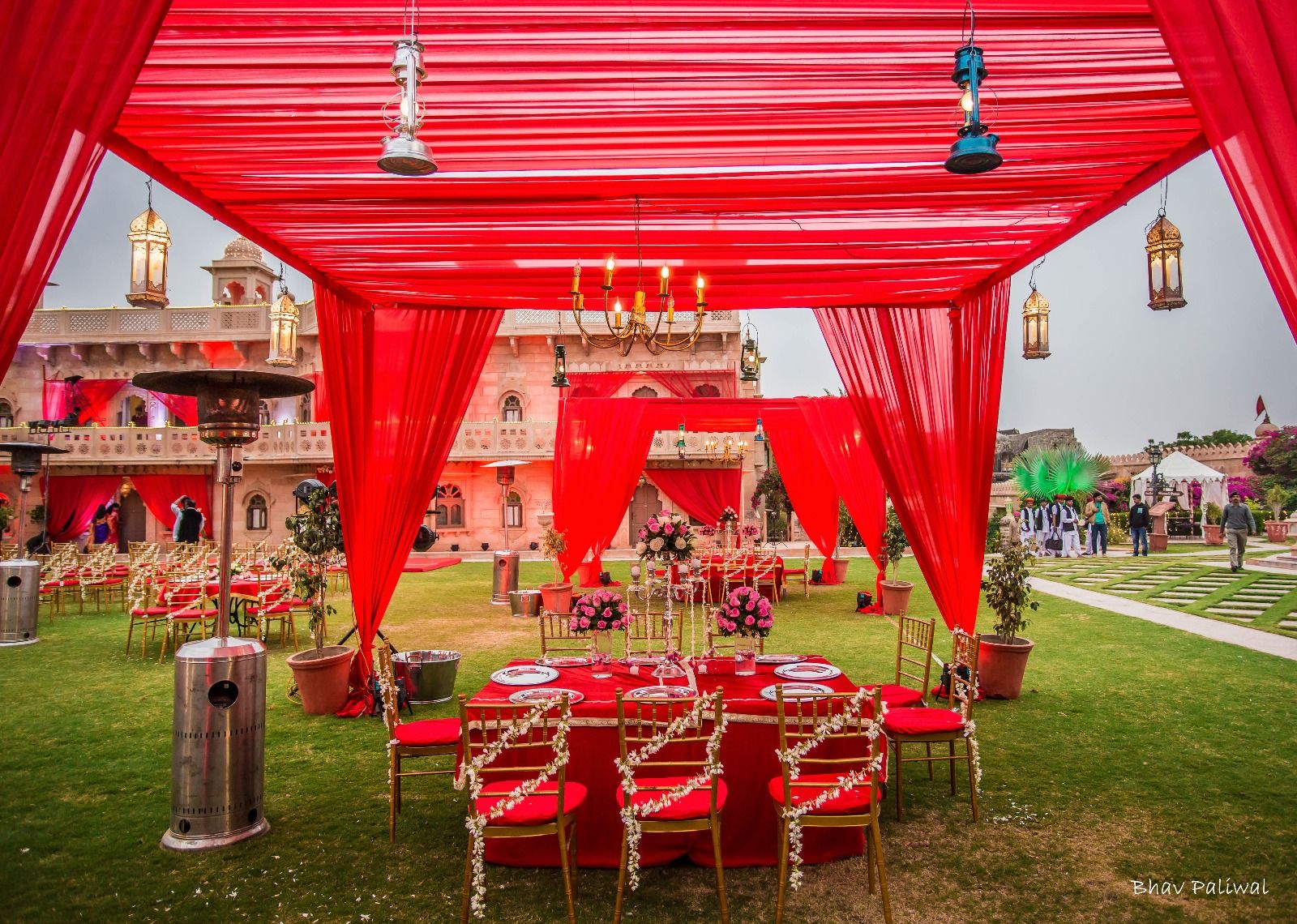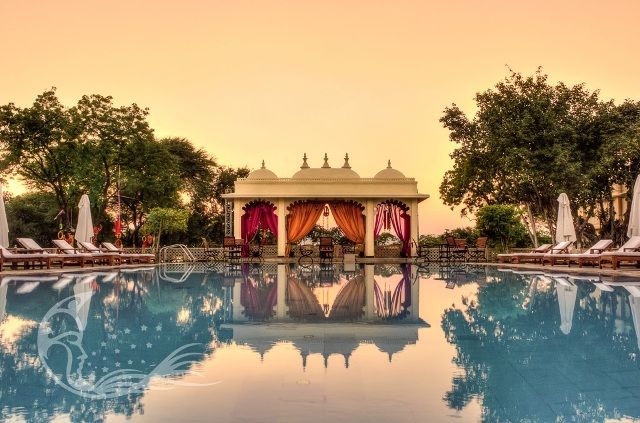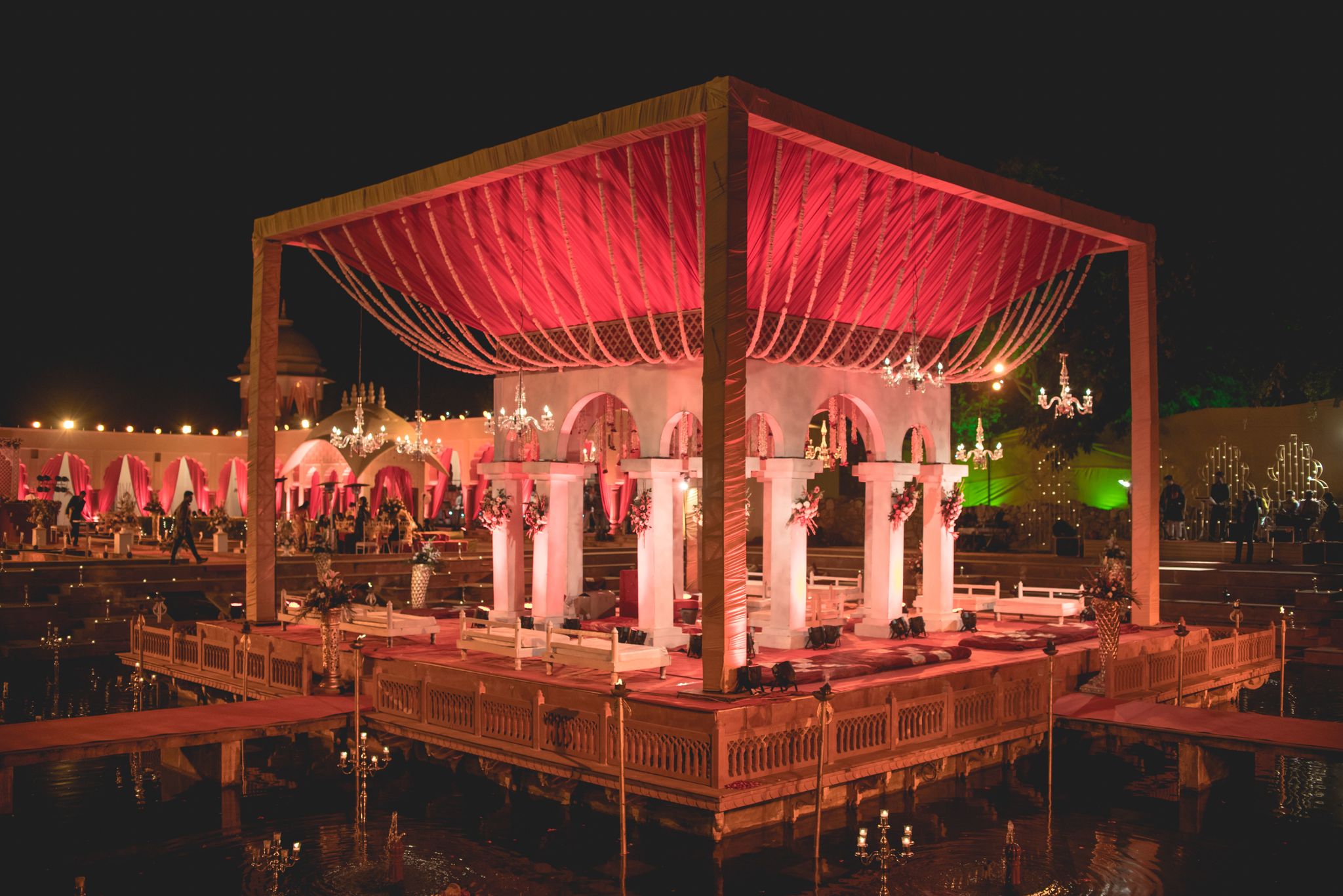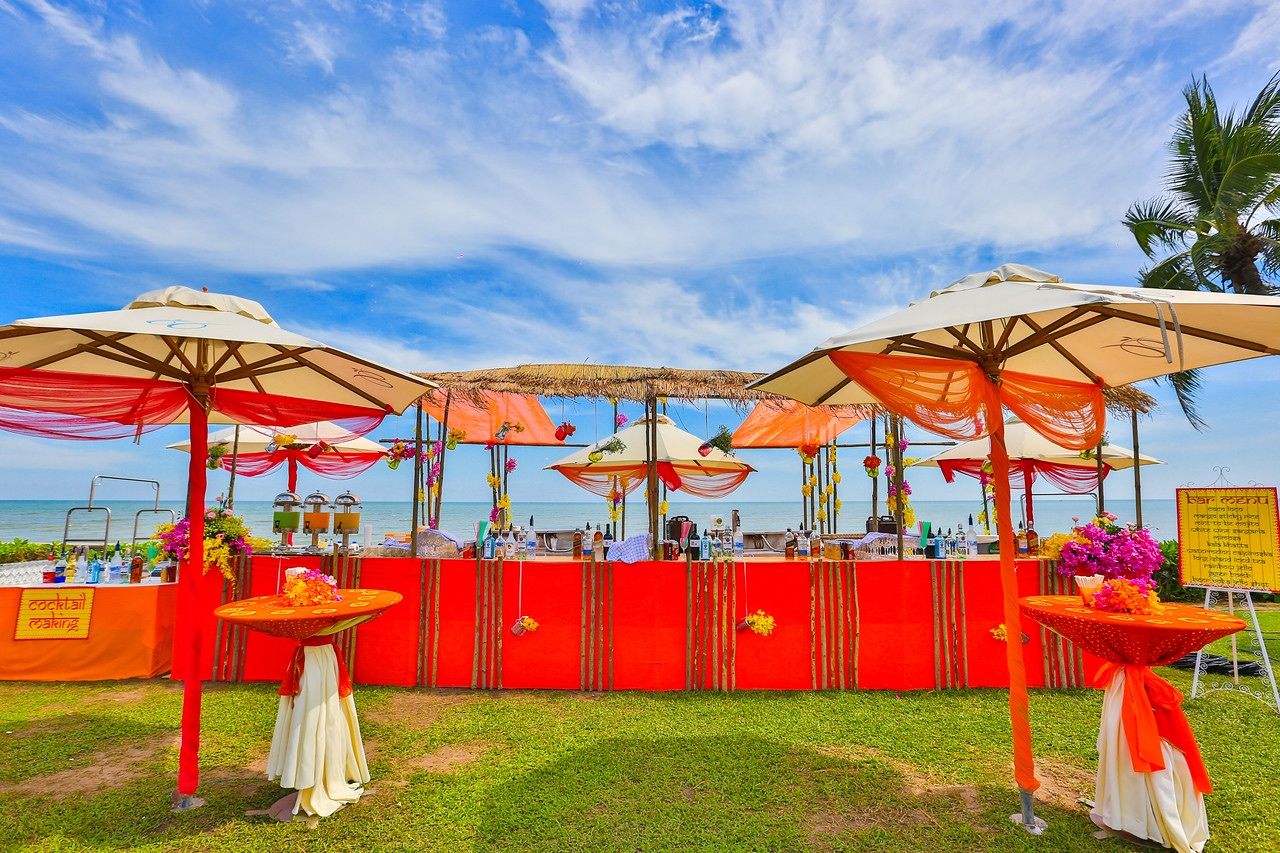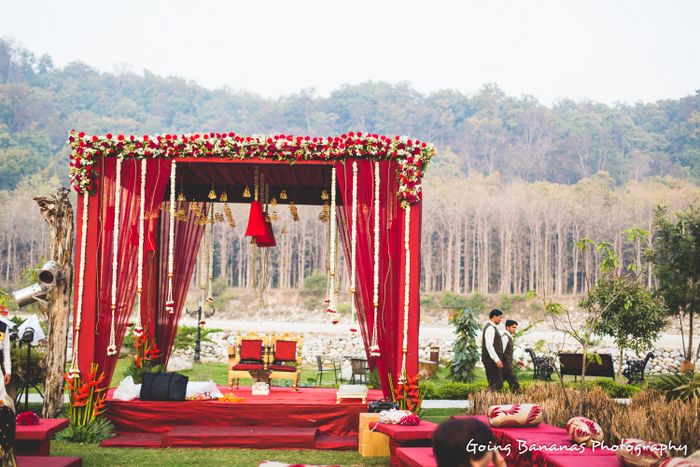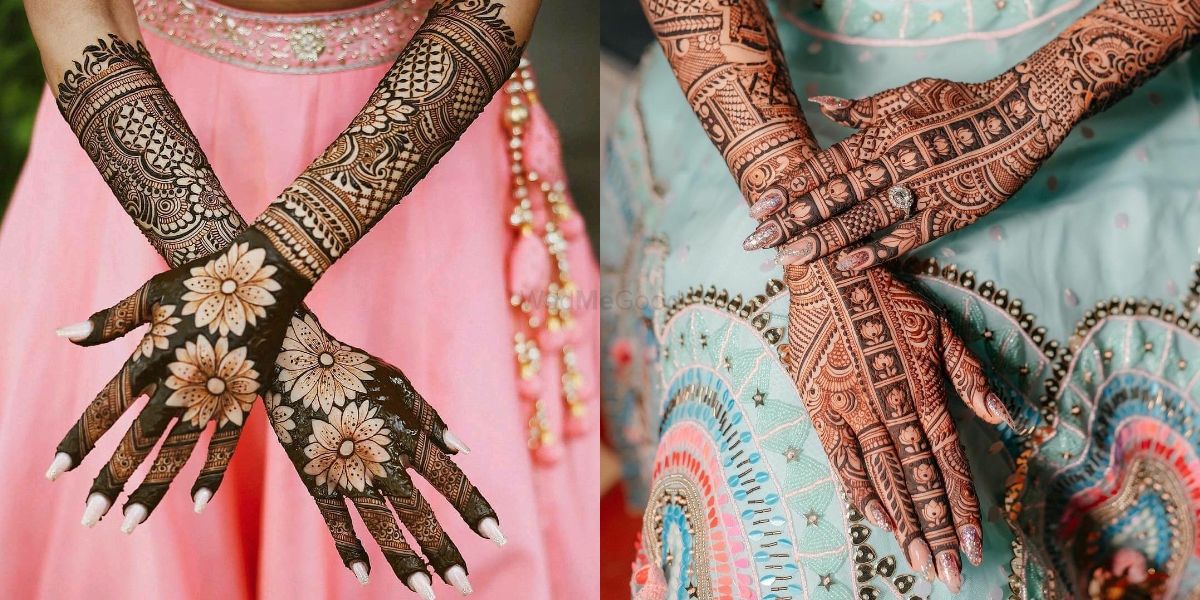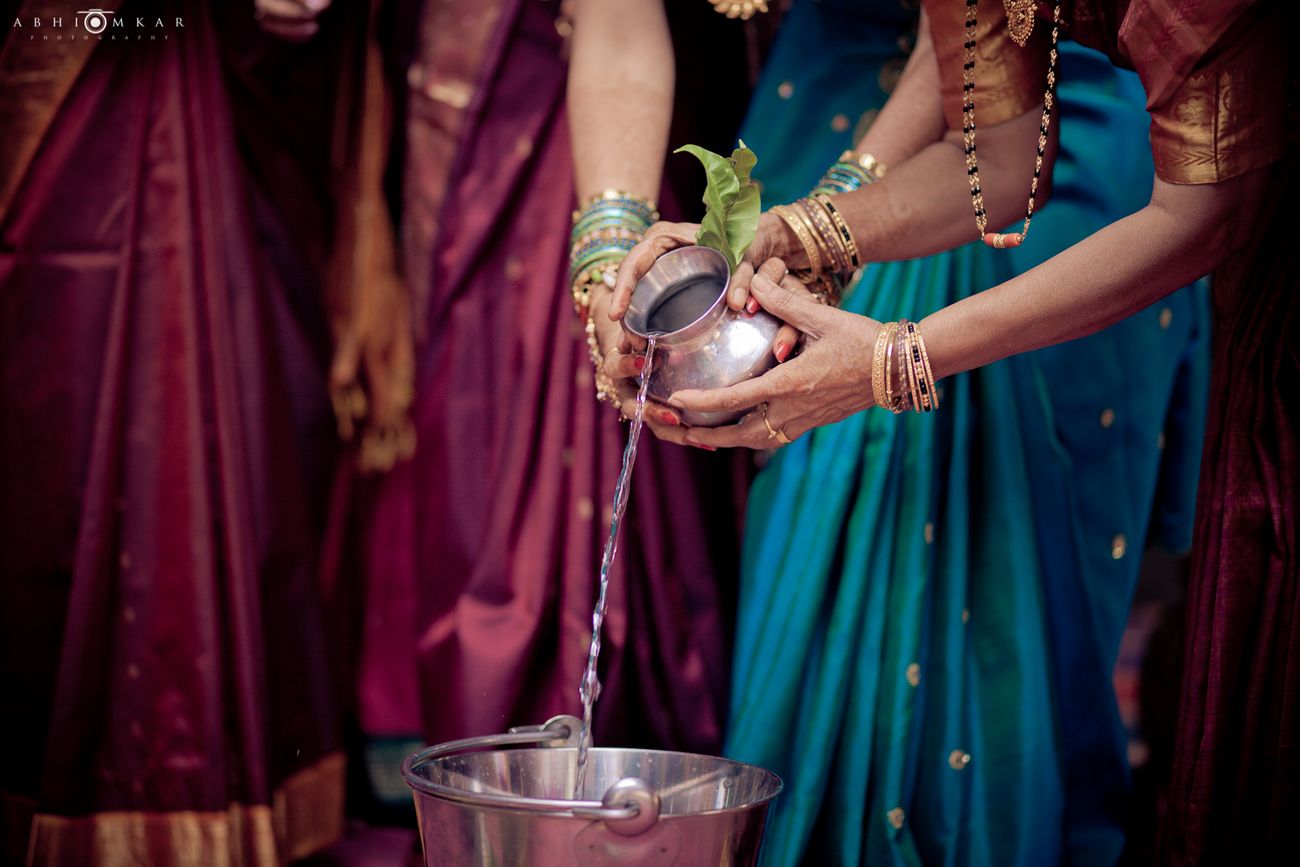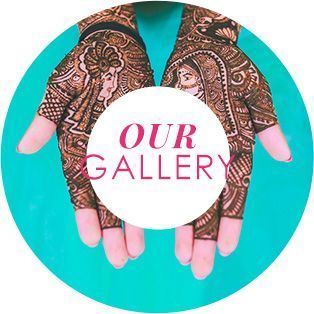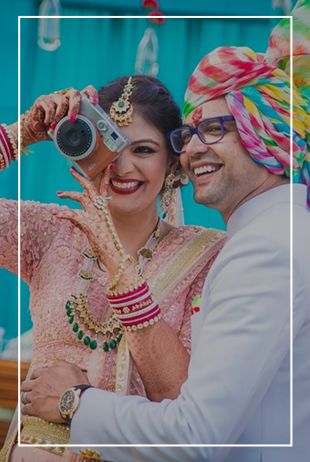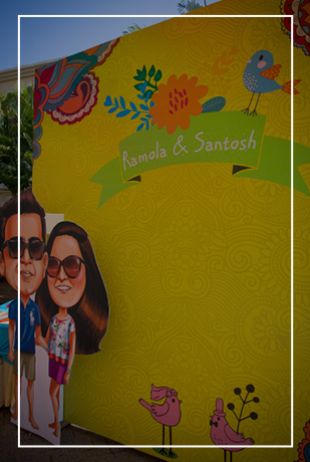Konkani Wedding : Rituals & Wedding Traditions
BY Soundarya Athimuthu | 19 Apr, 2024 | 833 views | 10 min read
Picture this: The sun dips below the horizon, casting a warm glow on the lush coastal regions of Goa and Karnataka. Now, add to this scene the lively beats of traditional Konkani music and the aroma of mouthwatering authentic delicacies. What's brewing? A Konkani wedding, my friend – a celebration as vibrant as the landscapes it unfolds against.
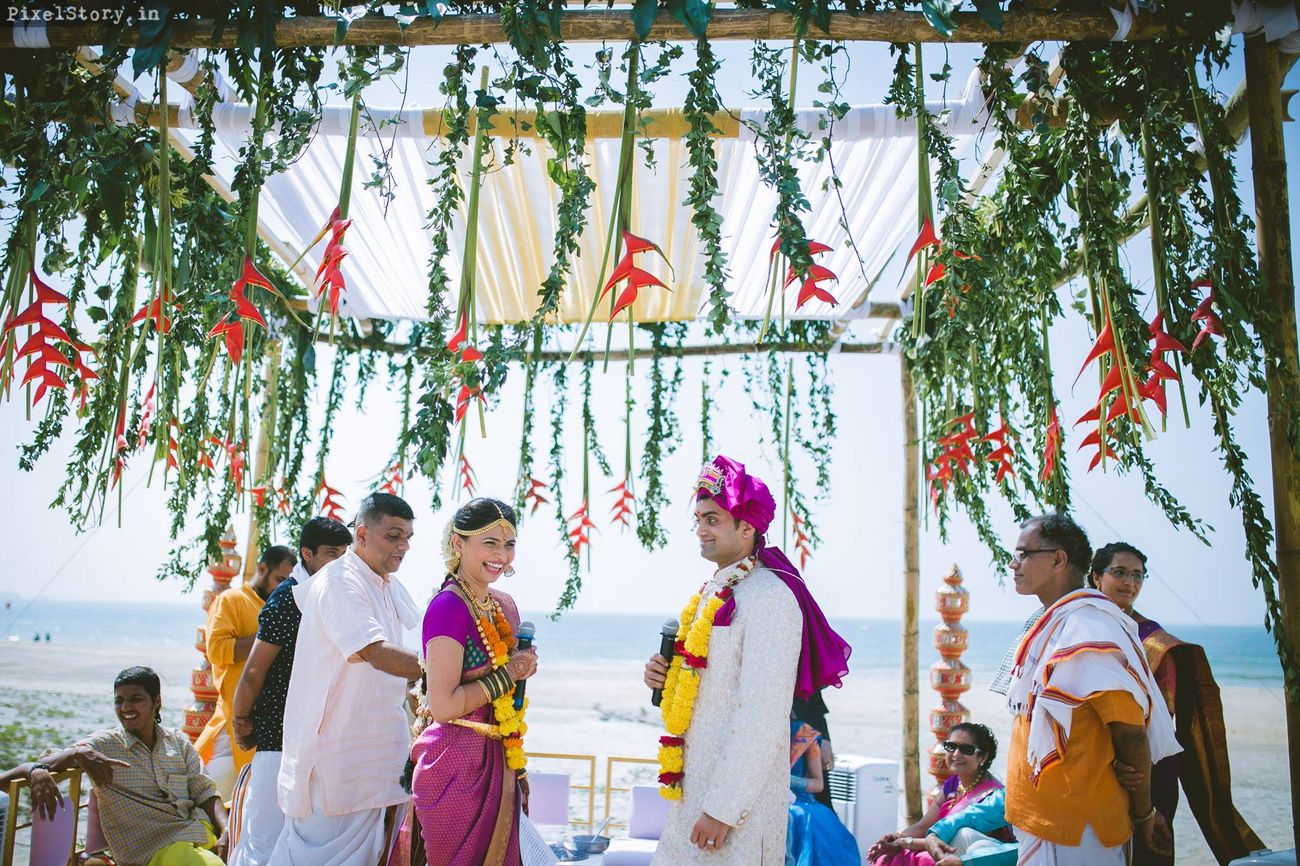
Image via Pixelstory.in
Get ready because we're about to delve into the magical world of Konkani weddings. Think of it as a journey where tradition meets the cool breeze off the Arabian Sea, and rituals play out like scenes from a heartwarming romantic film.
Gleaming Traditions: Exploring the Exquisite Jewellery & Authentic Attire of a Konkani Wedding
Konkani wedding attire is a beautiful amalgamation of tradition, elegance, and authenticity. From the vibrant hues of the bridal saris to the understated sophistication of the groom's attire, every element reflects the rich cultural heritage of the Konkani community. Through intricate craftsmanship and attention to detail, Konkani wedding attire continues to mesmerize with its timeless charm, serving as a testament to the enduring traditions and customs of this vibrant culture.
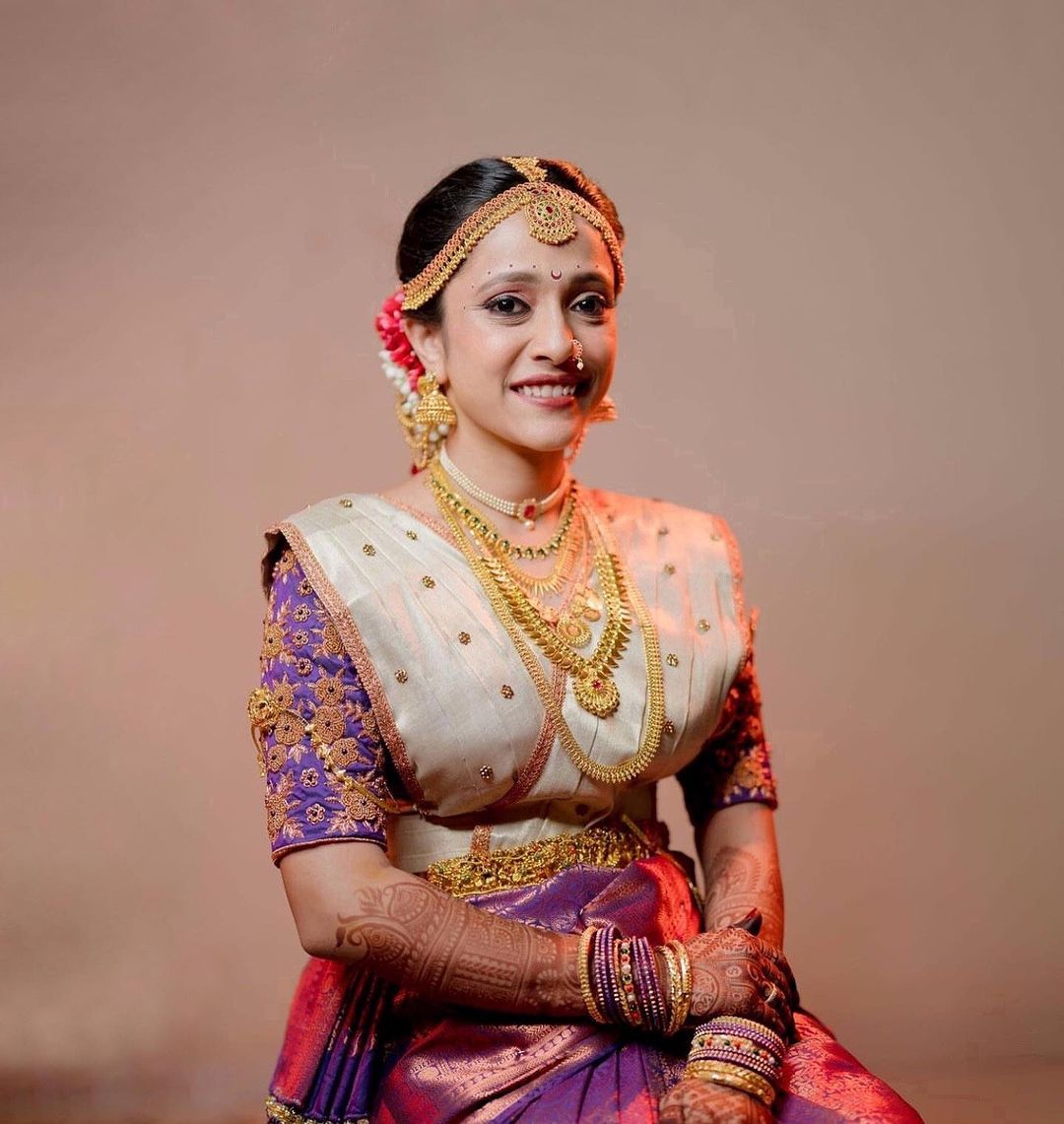
Image via konkanivhakkal
Konkani brides are decked out in stunning sarees often sourced from Kanjeevaram and Banaras - think of vibrant shades of red, gold, white and pink. It is usually adorned with intricate embroidery, zari work, and embellishments like sequins, beads, and stones. Plus, let's not forget the bindi on her forehead – it ties the whole look together beautifully.

Image via deepikapadukone
On the other hand, Konkani grooms typically wear a dhoti-kurta ensemble or a sherwani, often in rich colours like cream, gold, or maroon. This attire is accessorized with a turban, known as a "pheta." The groom also wears traditional footwear like mojris or sandals, completing the classic Konkani groom look.
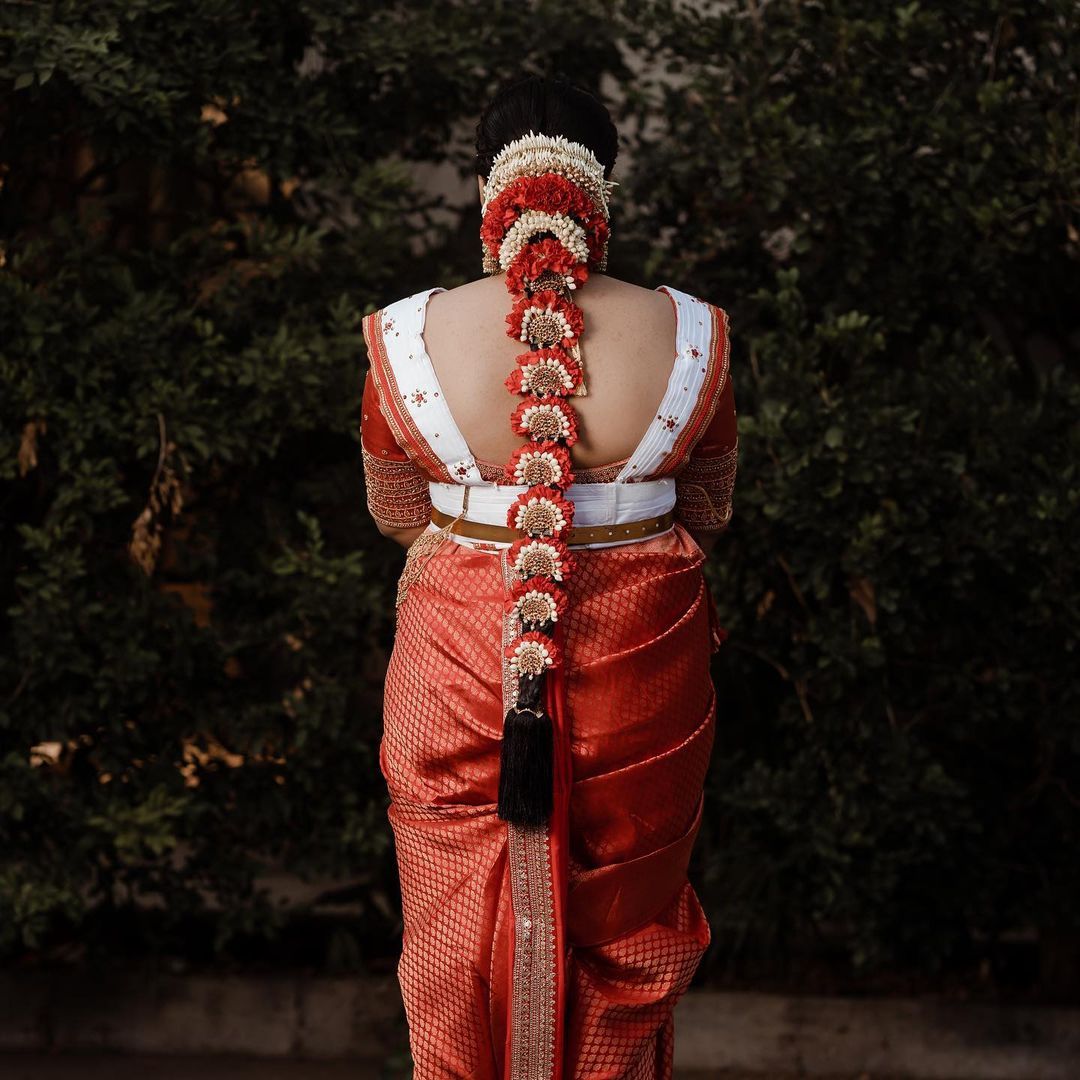
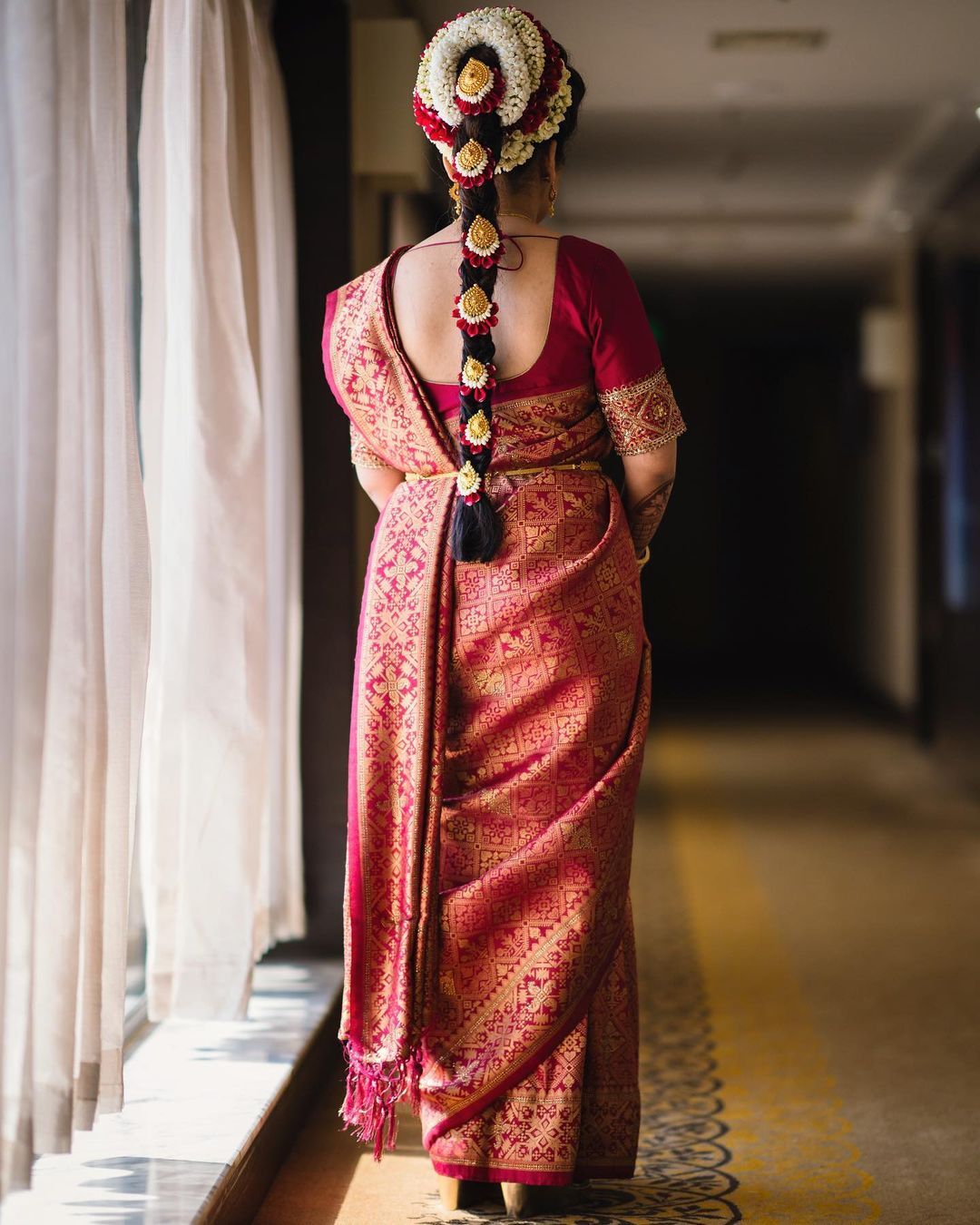

Images via reshmesaigalweddings and Pinterest
Draped in the splendor of tradition, a Konkani bride's jewelry is a captivating fusion of gold and vibrant gems, echoing the richness of her culture along the sun-soaked western coastline. From the everyday grace of Goth bangles to the regal Tode and the enchanting Pichodi, each piece tells a tale of timeless craftsmanship. The Kasithaali Mangalorean mangalsutra made of gold and coral, Galsiri's coin lockets, and Vel earrings add a touch of cultural pride. Adorning the upper arm, the ornate Bajubandh, the Nathini with pearls and vibrant stones, and the Piddukachi Kankna complete the ensemble, encapsulating the essence of a Konkani bride's heritage in a symphony of elegance.
Pre-Wedding Rituals
Konkani weddings commence with a series of pre-wedding rituals that set the tone for the joyous occasion.
Seeking Celestial Bonds: Konkani Families in Search of Horoscope Matches
Hindu Konkani Weddings typically commence with horoscope matching, or what’s called Kundali Milan. In the delicate dance of love, Konkani families seek cosmic harmony through the ancient tradition of horoscope matching. Like celestial detectives, they exchange starry maps, allowing a Pandit to weave destiny's threads together. If the cosmic puzzle aligns, a joyous Muhurat is set, ushering in a harmonious journey into matrimony under the celestial guidance of the universe.
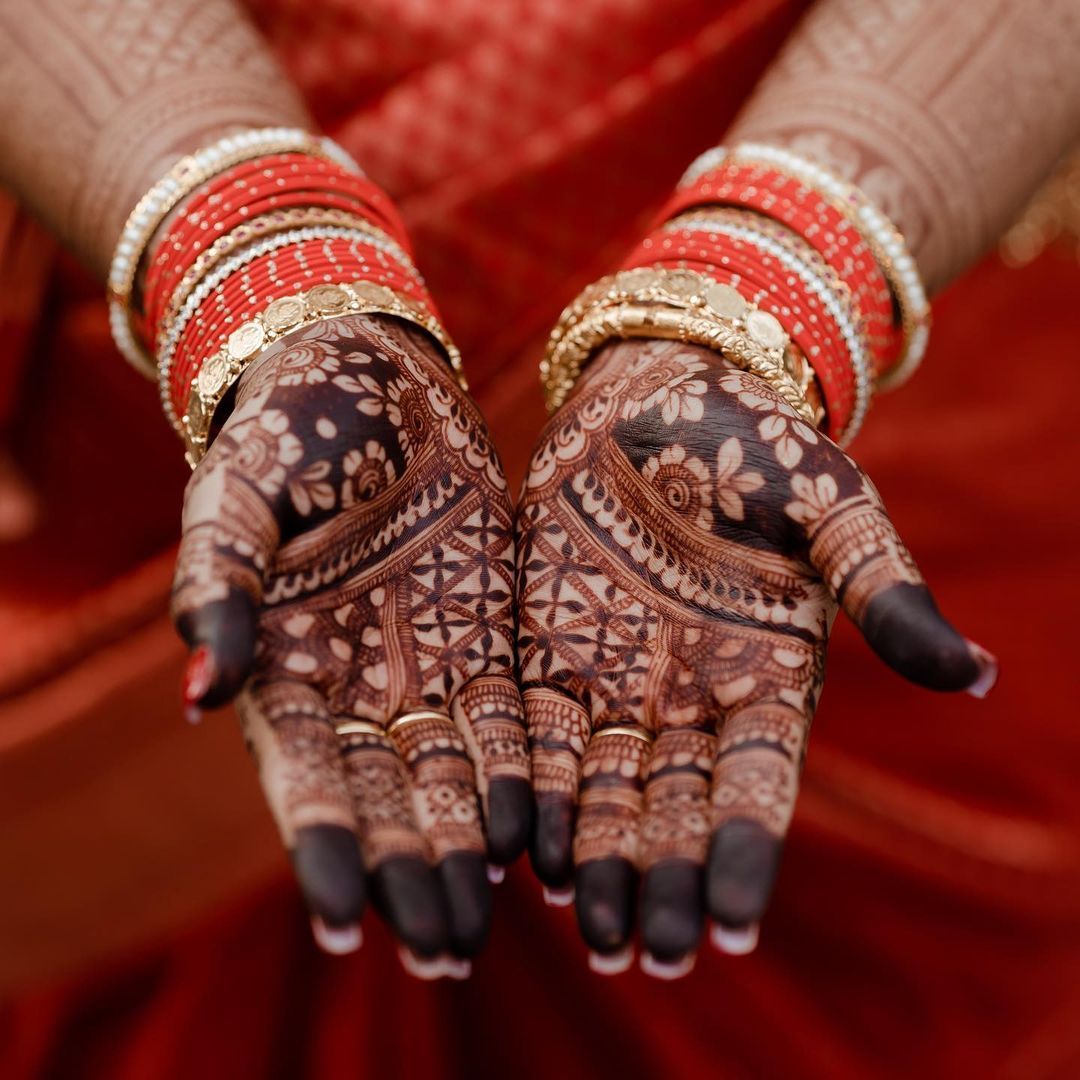
Image via Pinterest
While haldi, tilak, varmala, and mehendi ceremonies, which are quite common in Hindu weddings, overlap in Hindu Konkani weddings too, let's now take a closer look at some of the exclusive rituals in Konkani weddings.
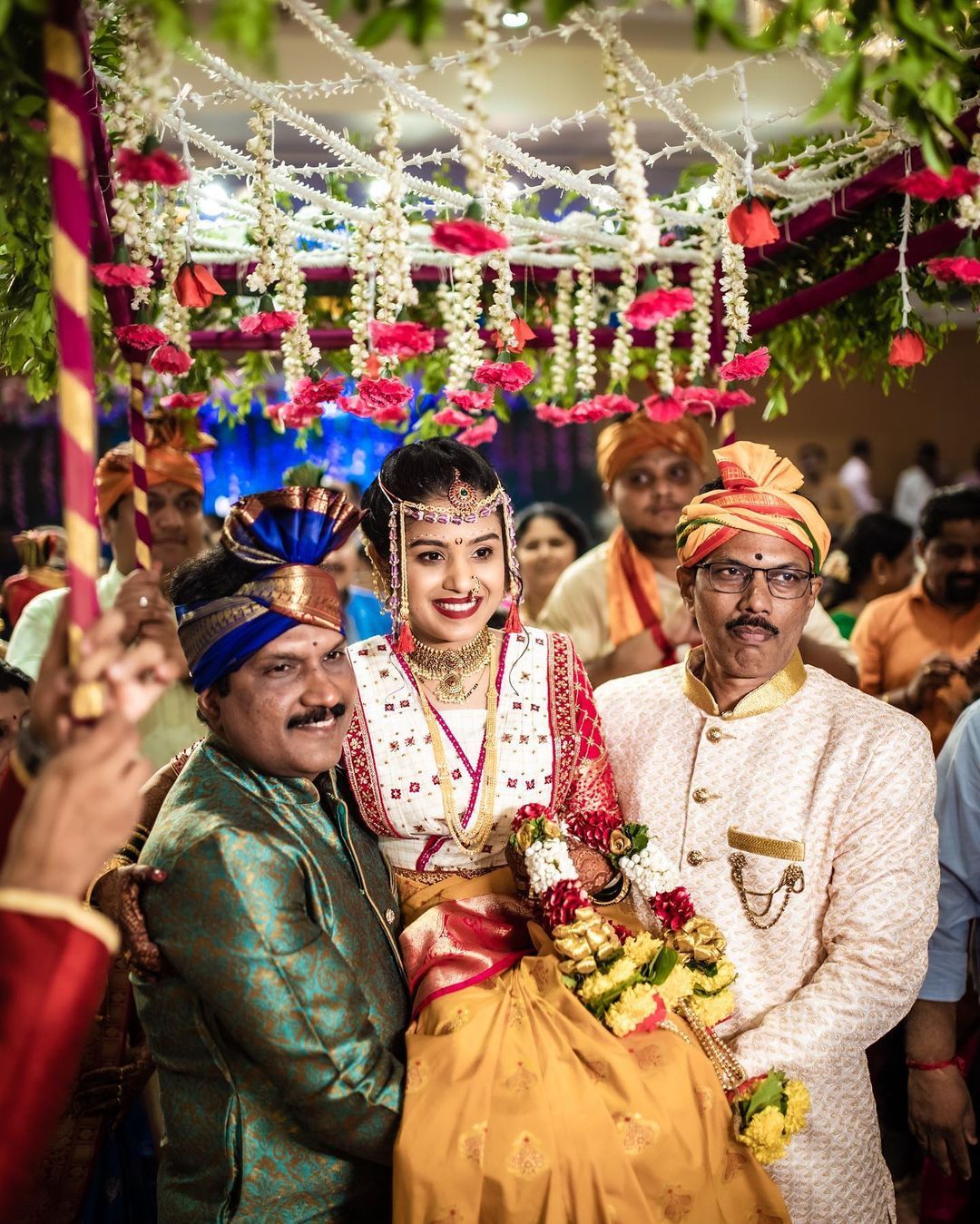
Image via ncbridalstudio
Bridal Sanctity: Unveiling the Naandi Pooja and Antarpath Rituals in Konkani Weddings
One of the first and sacred rituals in a Konkani wedding is the Naandi Pooja, conducted ten days before the wedding. It involves offering prayers and expressing gratitude to both God and ancestors. Through the symbolic gesture of offering five coconuts, blessings and positive energies are invoked, believed to dispel any lingering negativity and create a protective shield around the soon-to-be-married couple.
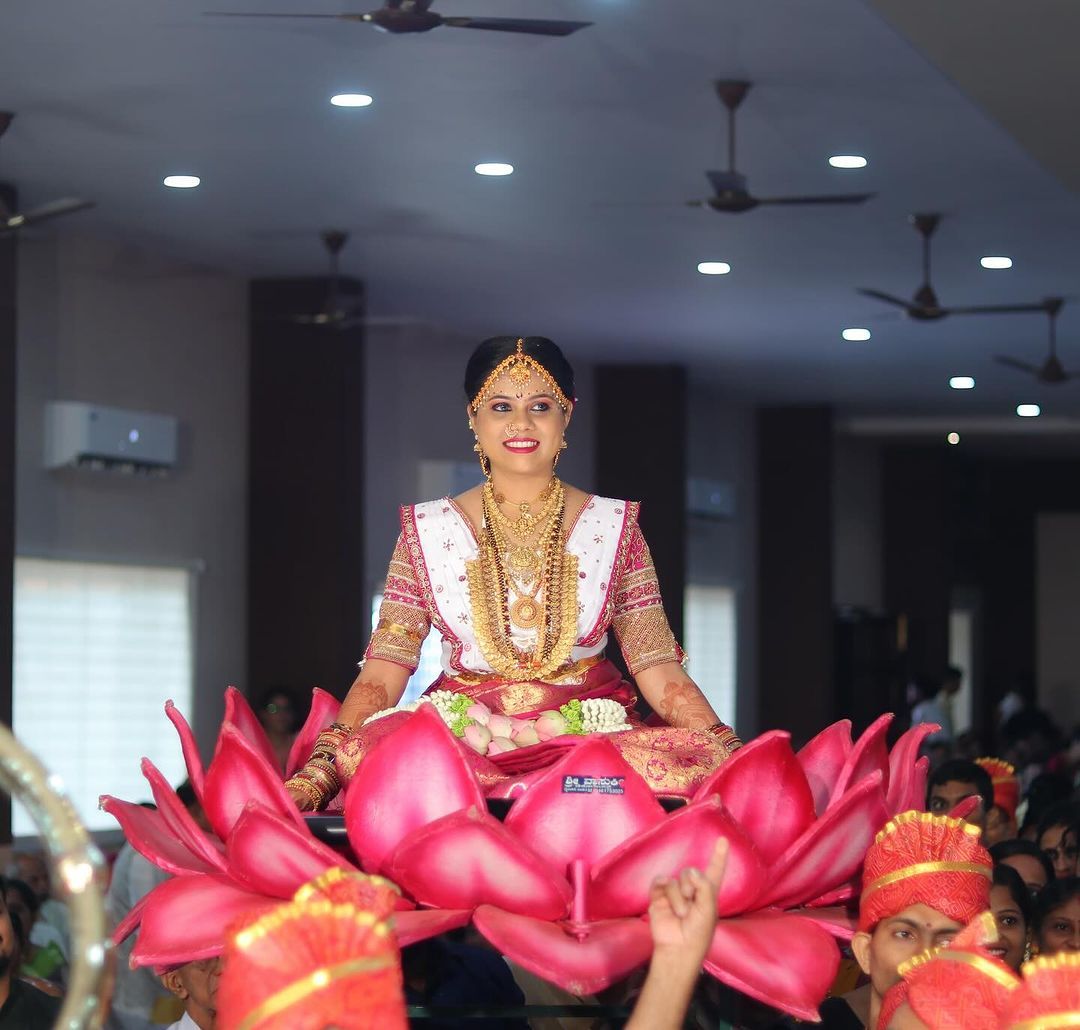
Image via konkanivhakkal
Following this ceremony, the couple abstains from meeting each other until the wedding day, adhering to a Saatvik diet devoid of non-vegetarian fare and ingredients like onion and garlic, further enhancing the sanctity and preparation for their union.
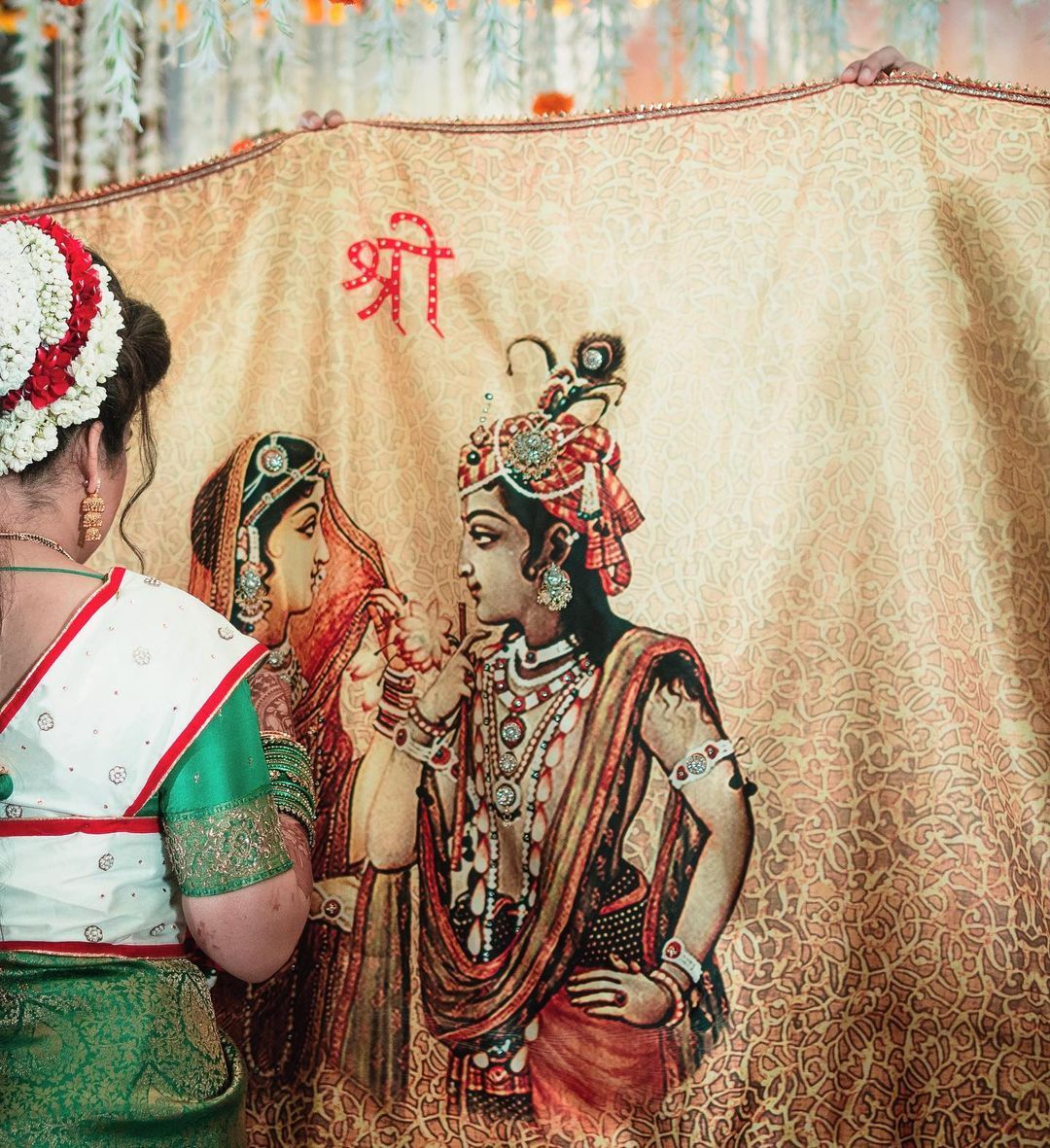
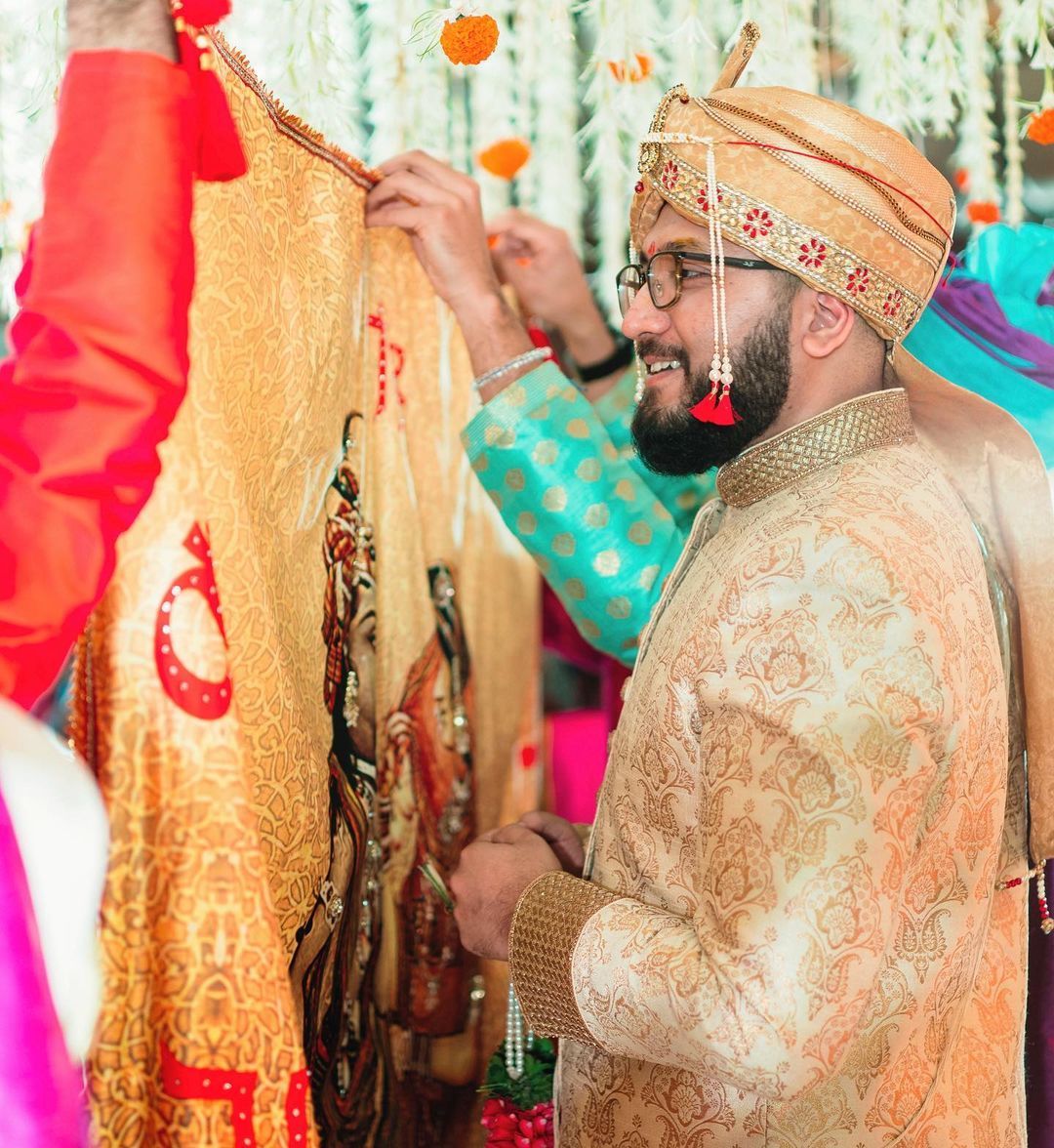
Image via reshmesaigalweddings
Another significant ritual is the Antarpath, where an auspicious and sacred cloth is held between the bride and groom, preventing them from seeing each other until specific mantras are recited on the wedding day.
Grinding Unity: The Significance of Udida Muhurat in Konkani Weddings
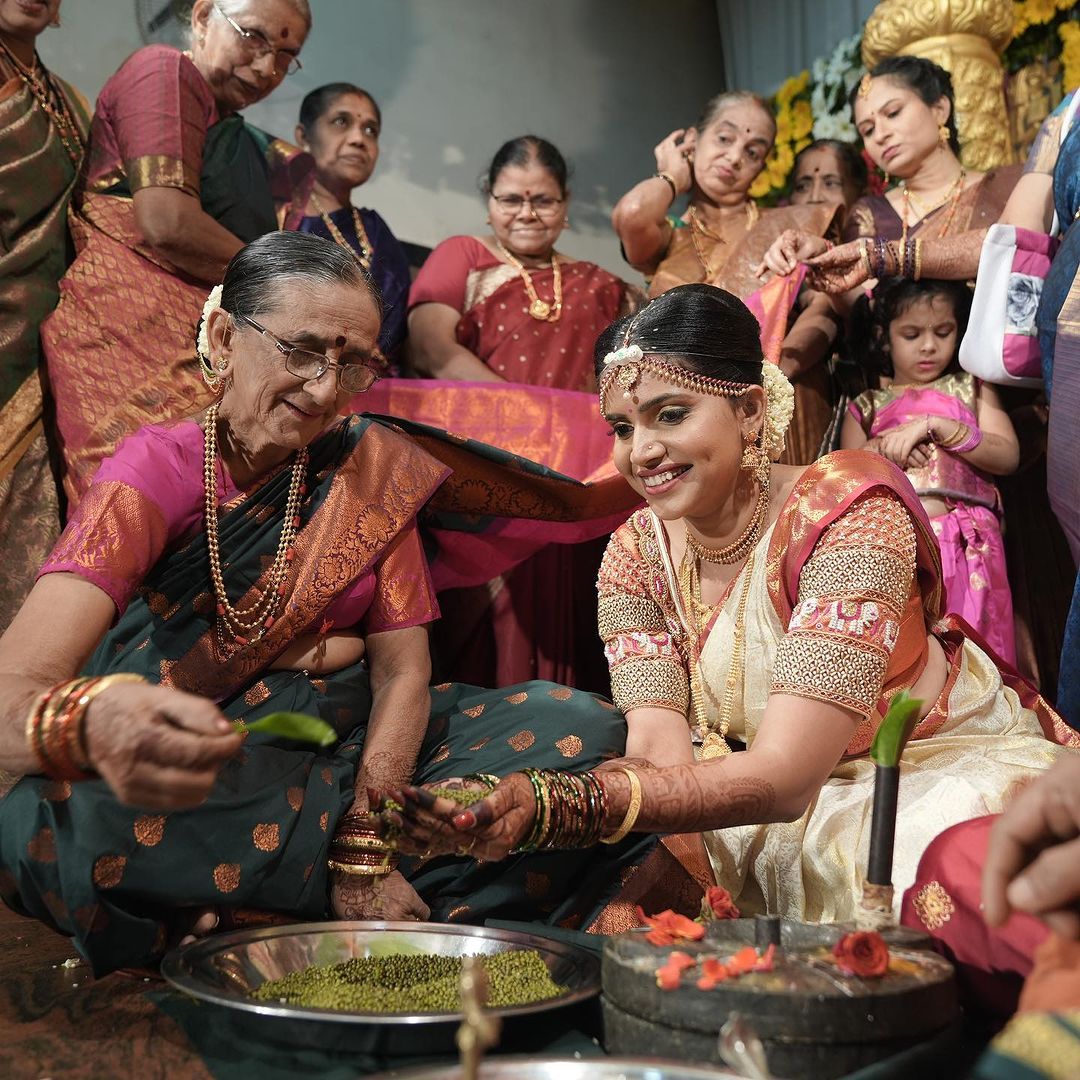
Image via konkanivhakkal
The Udida Muhurat holds a special place in Konkani weddings, representing an intimate and meaningful ritual. During this ceremony, the bride and groom come together to grind black gram or udidu in a traditional stone grinder. It serves as a symbolic gesture, welcoming the bride into her new family and home, while also teaching her the traditional skills and responsibilities associated with managing a household. Importantly, the participation of both the bride and groom underscores the spirit of partnership and cooperation that is foundational to their married life. As they engage in this shared activity, laughter and joy often fill the air, reflecting the warmth and camaraderie between the couple as they embark on their journey together.
Bangle Blessings: Exploring the Ritual of Kankan Survuche in Konkani Weddings
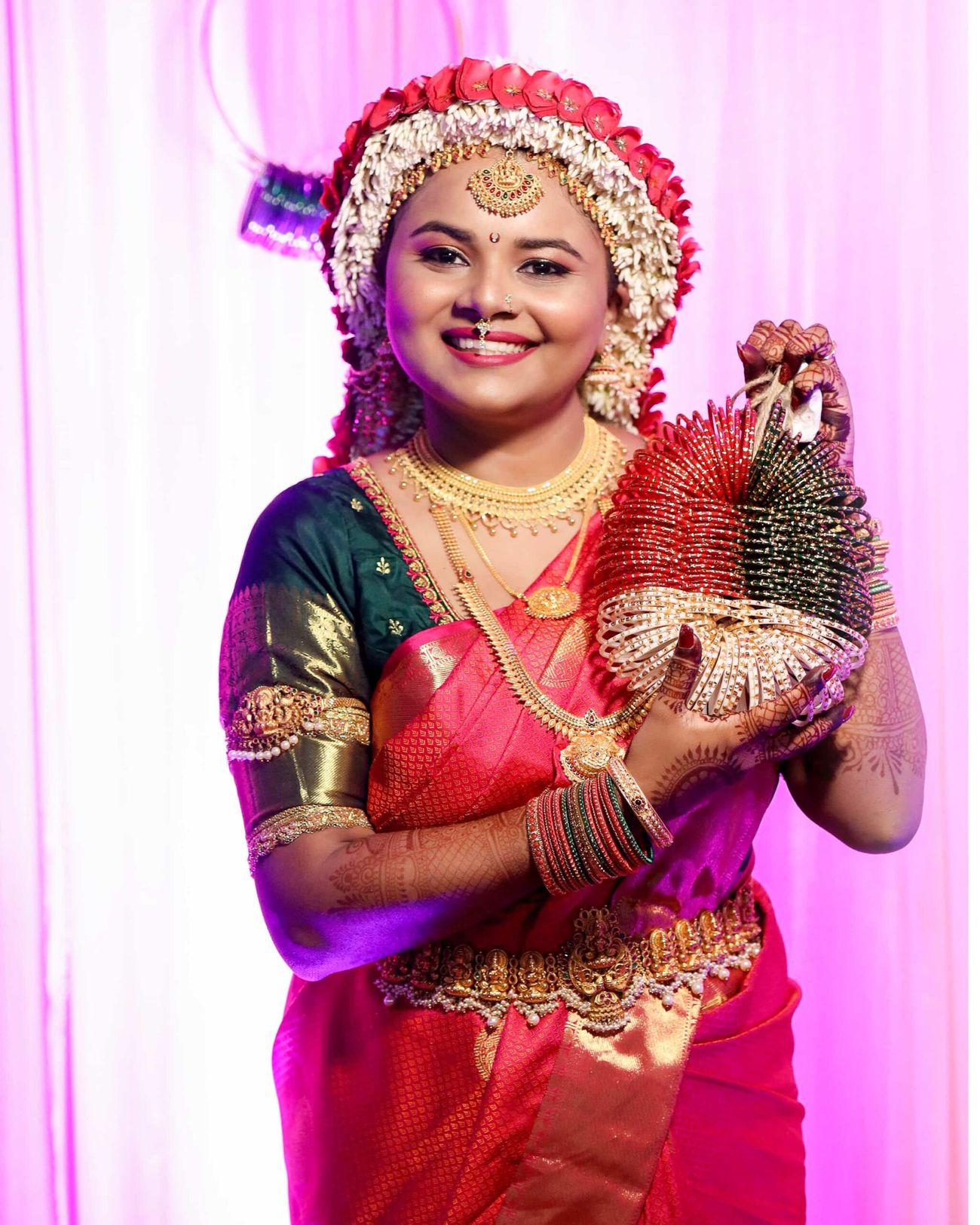
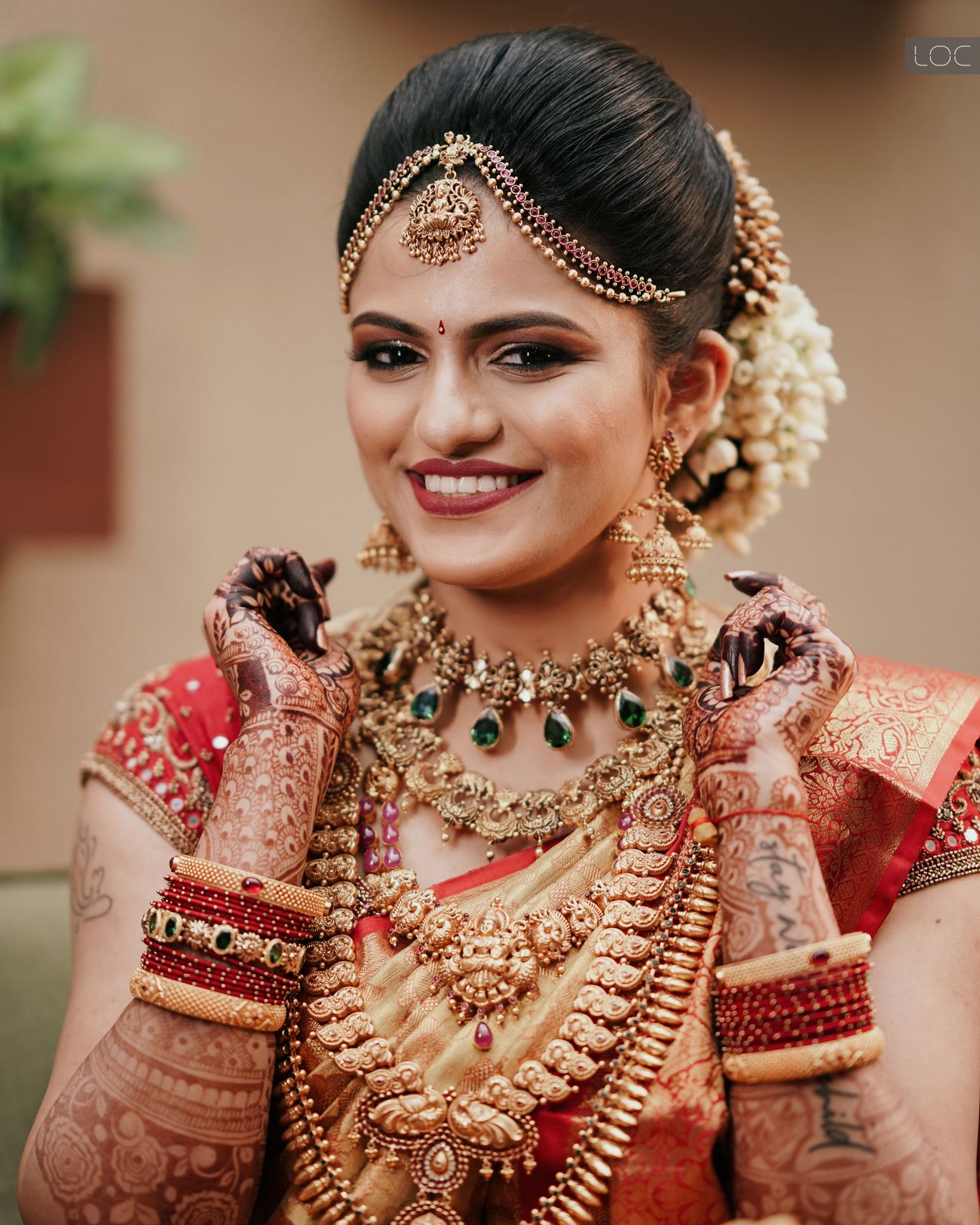
Image via Pinterest
"Kankan Survuche," the revered "bangle ceremony" in Konkani weddings, is a cherished tradition symbolizing marital auspiciousness. Held after the 'Haldi' ceremony or a few days prior to the wedding, it involves adorning the bride's wrists with vibrant bangles, believed to signify the groom's longevity and the bride's prosperity. This ritual evokes a sense of joy and celebration among family members, enhancing the festive ambiance of the wedding preparations.
Jasmine Dreams: The Timeless Tradition of the Phool Muddi Ceremony in Konkani Weddings
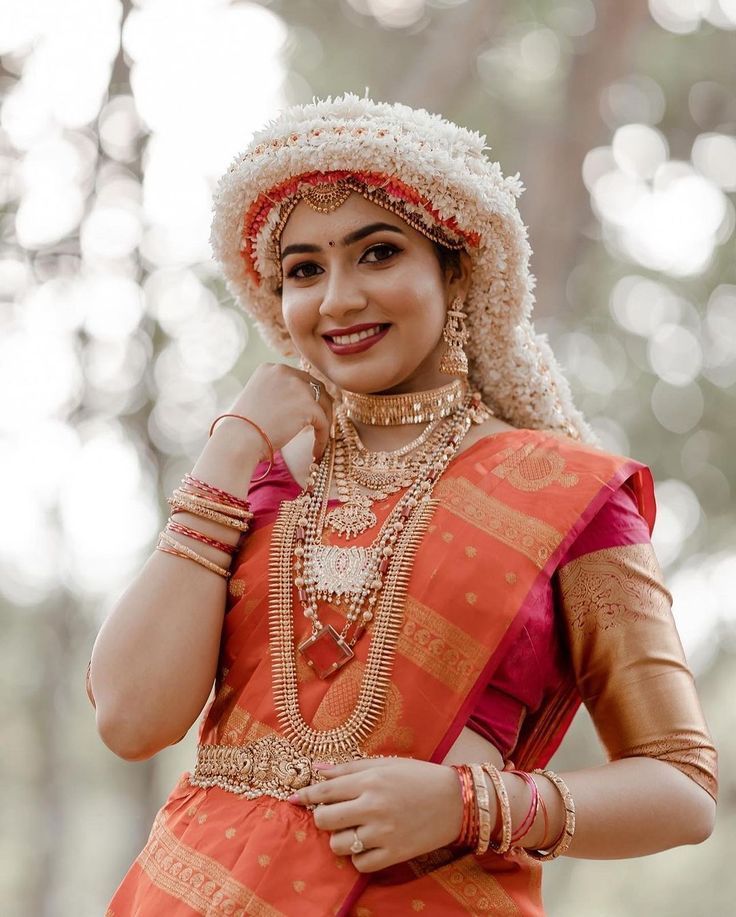
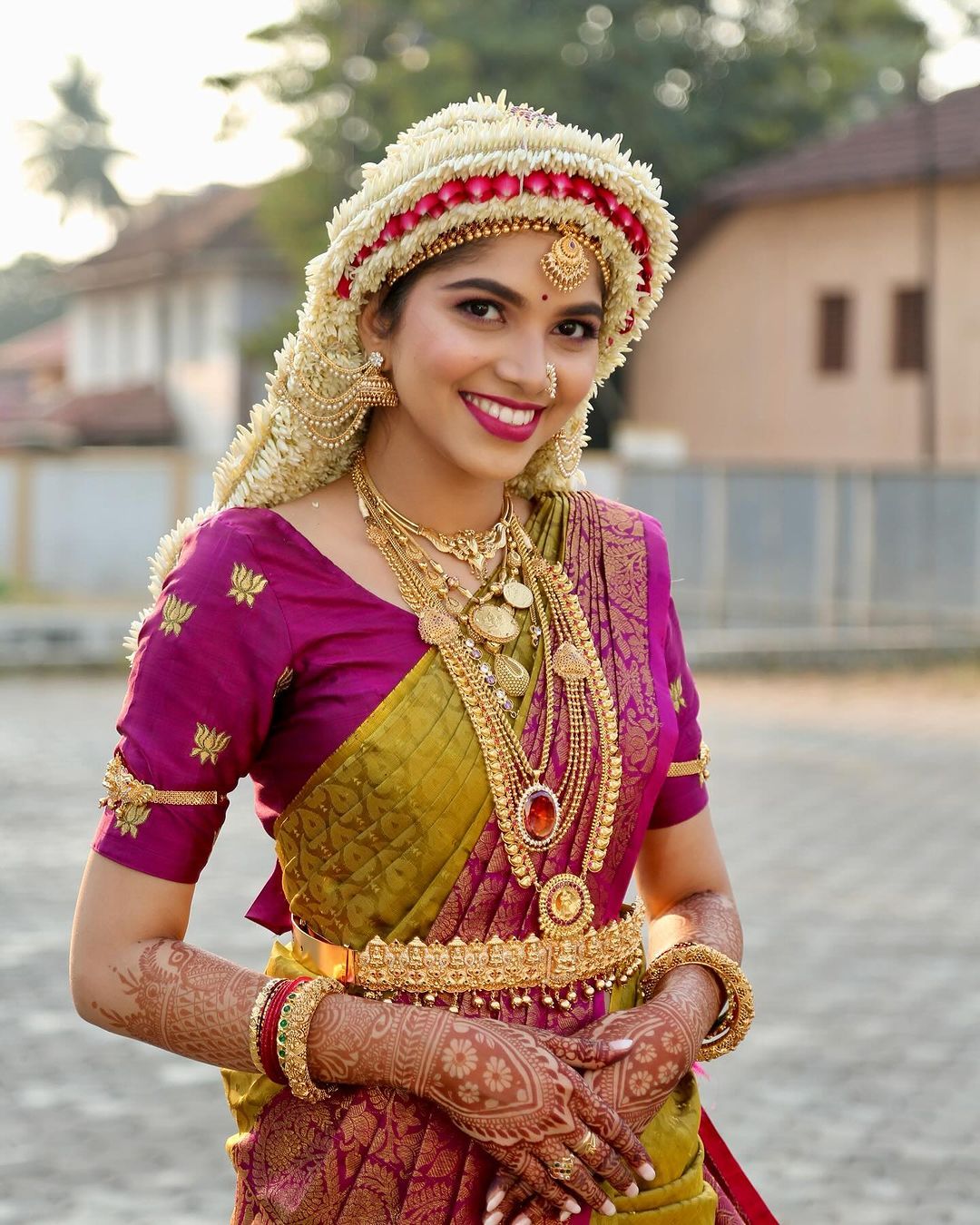
Image via Pinterest and konkanivhakkal
The "Phool Muddi Ceremony" in Konkani weddings is a delightful tradition filled with symbolic gestures and heartfelt blessings. During this ritual, the bride's father graciously presents the groom with a ring and new attire, while the groom's mother adorns the bride with fragrant jasmine flowers, known as 'Sohn Phool,' alongside exquisite gold embellishments. As the bride gracefully wears the 'Sohn Phool' atop her head, it signifies not just tradition but also the promise of prosperity and abundance in their marital journey.
ALSO READ: This Bangalore Wedding Was Full Of Gorgeous Decor & Hearty Smiles
Wedding Day Rituals
The Mandap Pooja is conducted before the wedding ceremony begins and typically takes place at the wedding venue where the mandap, or the sacred canopy, is set up. This ritual involves invoking the blessings of the divine and seeking auspiciousness for the upcoming union. The priest performs various prayers and rituals to purify the mandap and create a sanctified space for the wedding ceremony. It symbolizes the couple's commitment to embark on their marital journey with divine blessings and protection.
Blessings, Bonds, and Guardian's Embrace: The Symbolism of Mandap Pooja and Dharemani in Konkani Weddings
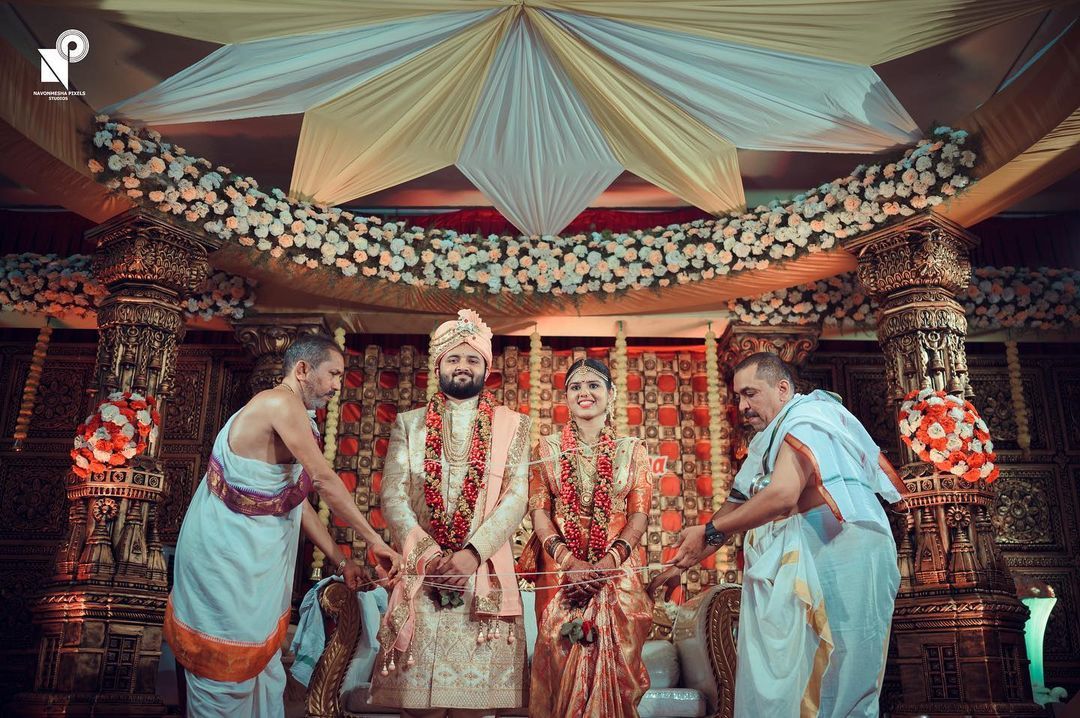
Image via konkanivhakkal
In Konkani weddings, the "dharemani" ritual holds deep symbolic significance. During this ceremony, the bride's mother lovingly ties a black-bead necklace around the bride's neck, signifying her protective embrace and intentions to safeguard her daughter from negative influences as she enters married life. This gesture represents the mother's heartfelt wishes for her daughter's well-being and happiness in her new journey.
Timekeeping Tradition: The Significance of Ghade Udda in Konkani Weddings
Image via abhiomkar
The "Ghade Udda" ritual holds significant importance in Konkani weddings, serving as a traditional timekeeping practice with spiritual symbolism. In earlier times, when clocks and watches were not readily available, this ritual provided a means to track time accurately. A small bowl containing tambula (betel leaves and nuts) and akshat (rice grains) is placed within a larger utensil filled with water. The small bowl has a hole, allowing water to gradually seep in. As the bowl sinks, it marks the passage of time, with each "Ghadi" equivalent to 24 minutes. This ritual is typically performed at sunrise (suryodaya), and the designated priest ensures that important wedding ceremonies, such as maladhaaran (rituals involving the bride's arrival) and kanyadaan (ritualistic handover of the bride to the groom), occur punctually according to traditional scriptures and customs.
Sacred Flames of Union: Layee Homa
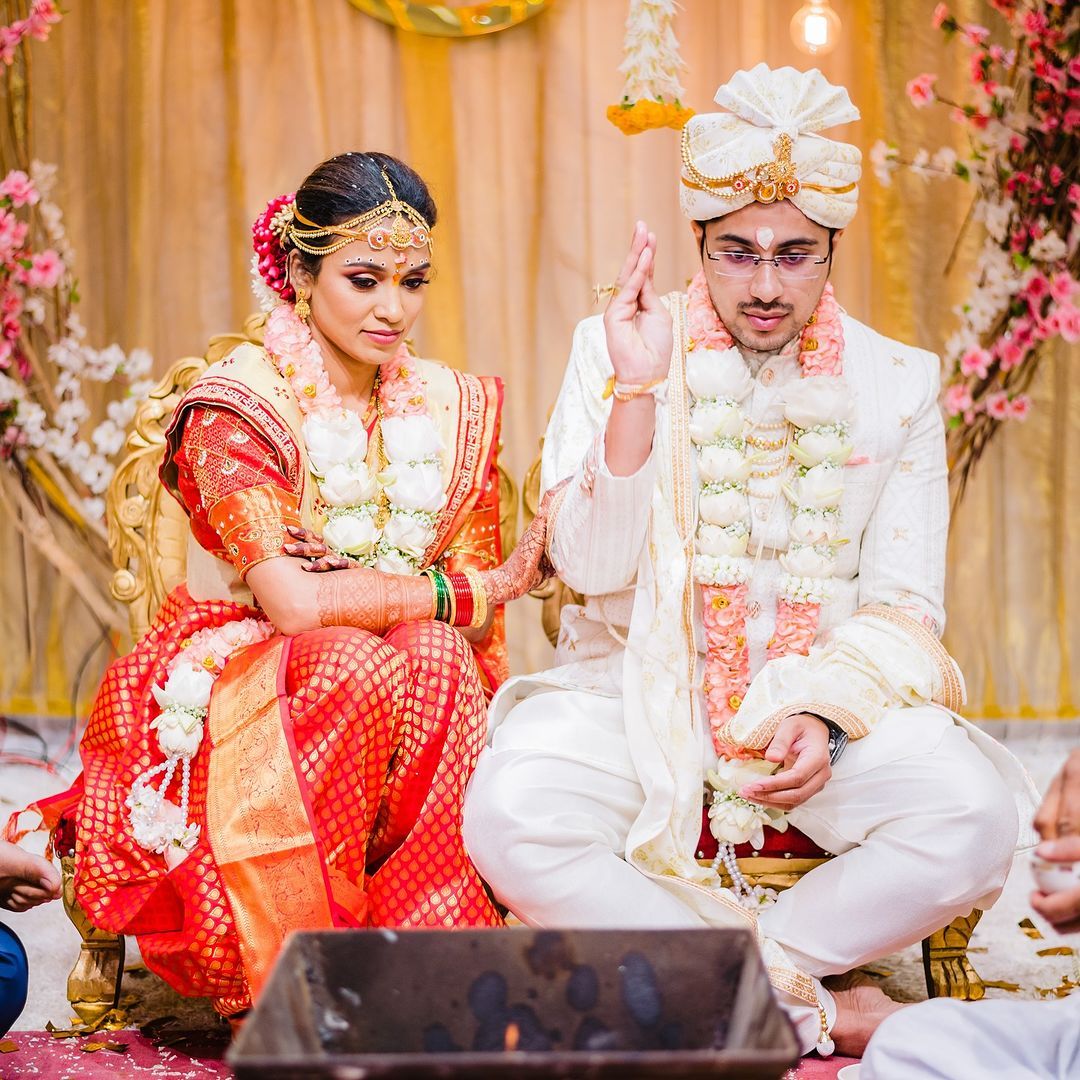
Image via bridesbyshrutiiyer
In the solemn ritual known as Layee Homa, also referred to as Laaja Homa, a hawan burns at the center, surrounded by the bride and groom and their respective maternal uncles and brothers, arranged in descending order of seniority. With reverence, a bag of rice is passed along this line of relatives, culminating in the offering of the rice into the sacred fire by the couple. The puffed rice is considered auspicious and is offered as a symbol of prosperity and fertility, invoking blessings for a happy and fruitful married life. Following this act, the bride receives the toe-ring, delicately placed on her toe by her maternal uncle, symbolizing familial blessings and marital commitment.
The Seven Vows of Eternal Bond: Saptapadi
Seven heaps of rice are placed between the bride and groom, and the bride steps on each mound individually as she moves towards the groom, accompanied by the priest's chants. Saptapadi embodies the essence of marital commitment as the bride and groom exchange seven vows, binding them together not just for this lifetime, but for eternity. These sacred vows represent the foundation of their union, promising love, loyalty, and mutual support through all the trials and joys of life.
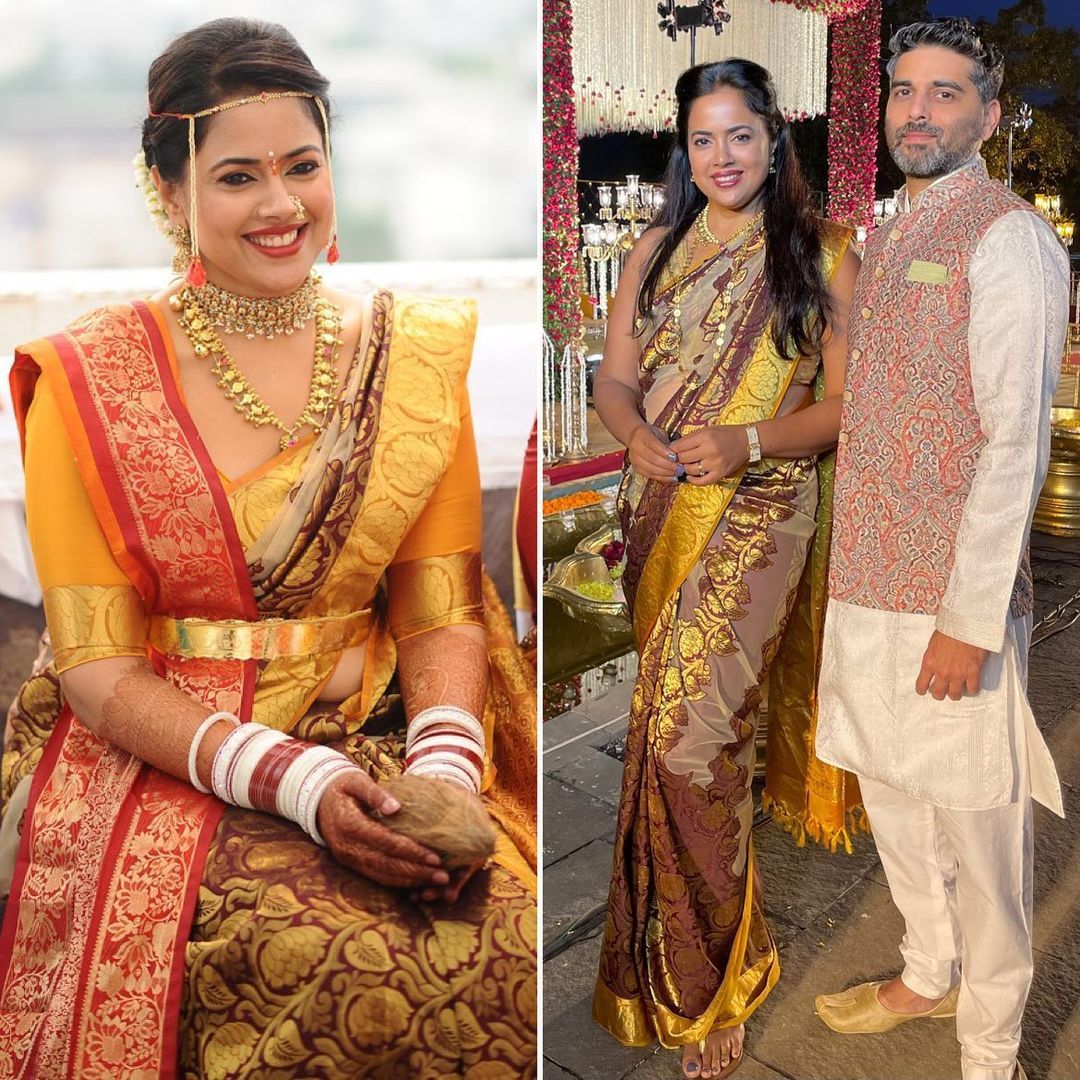
Image via reddysameera
Post-wedding Rituals
The wedding rituals are extensive in Konkani weddings, as are the post wedding rituals.
Pallu Setting and Embracing New Identity: Sheraga Ghalche in Konkani Wedding Customs
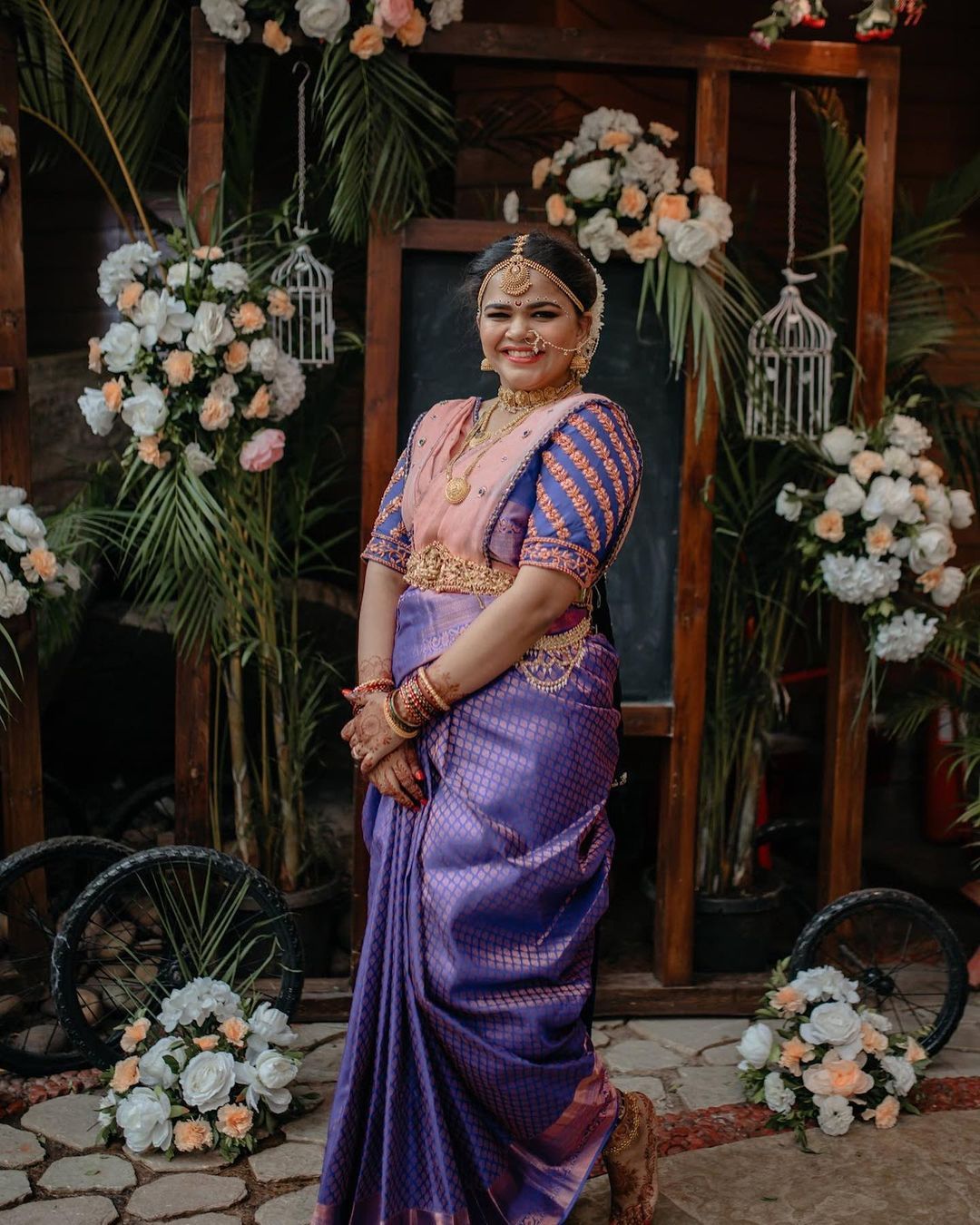
Image via konkanivhakkal
In Konkani weddings, "Sheraga Ghalche & New Name" is a significant ritual where the groom's mother arranges the pallu of the bride's new saree. This act symbolizes the bride's transition into womanhood and her acceptance into the groom's family. Additionally, during this ritual, the bride is bestowed with a new name, marking her integration into her new familial identity.
Okulimuddi: The Joyful Quest for Marital Dominance in Konkani Wedding Traditions
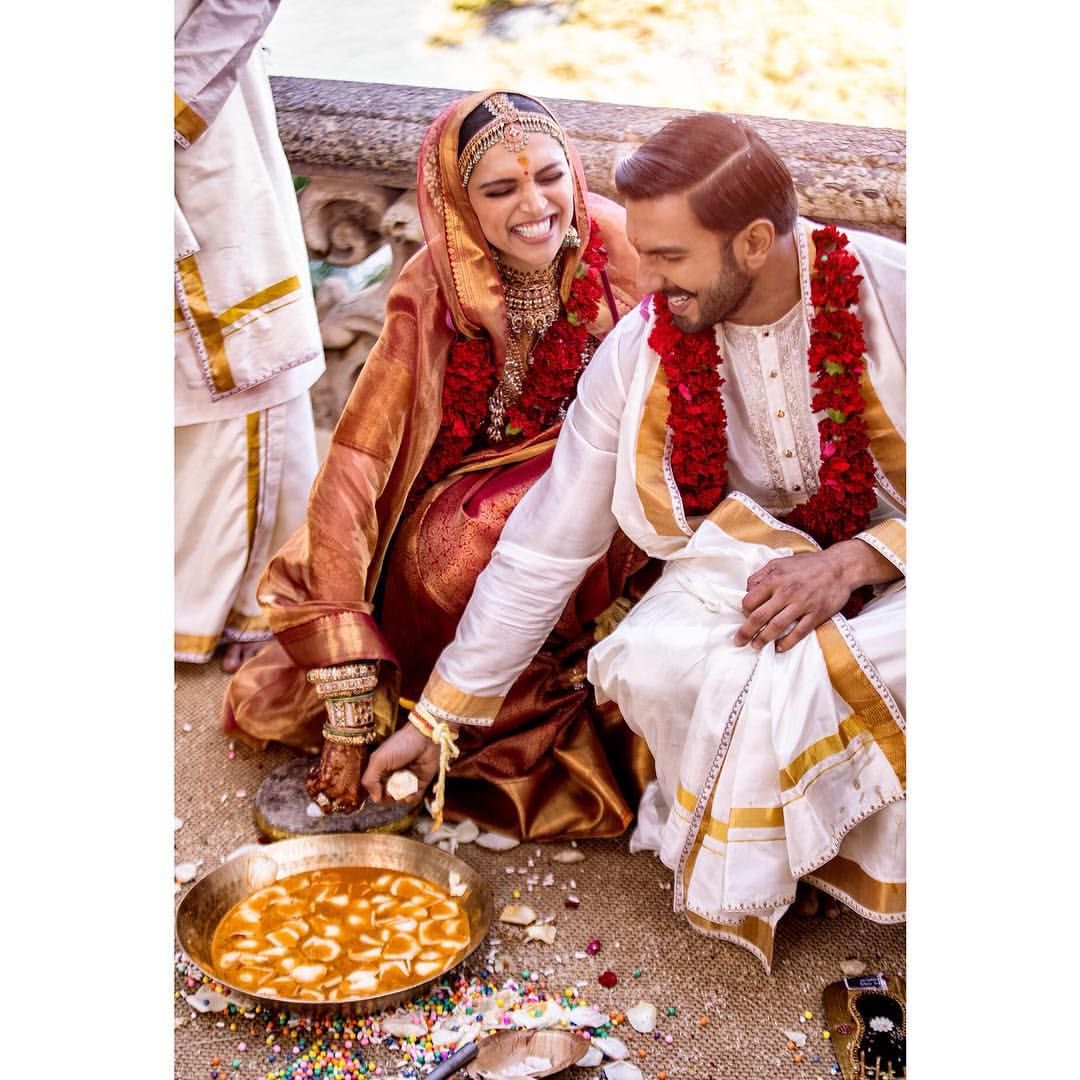
Image via Pinterest
"Okulimuddi" is a playful post-wedding tradition in Konkani weddings where the couple engages in a fun-filled game of finding a ring submerged in a tray of milk. This light-hearted activity, typically held after the couple's entry into their new home, adds joy and excitement to the celebrations. According to belief, the one who finds the ring is considered the more dominant partner in the marriage, though it's mostly seen as a lighthearted game rather than a serious determination.
Feasting on Tradition: The Post-Wedding Konkani Meal
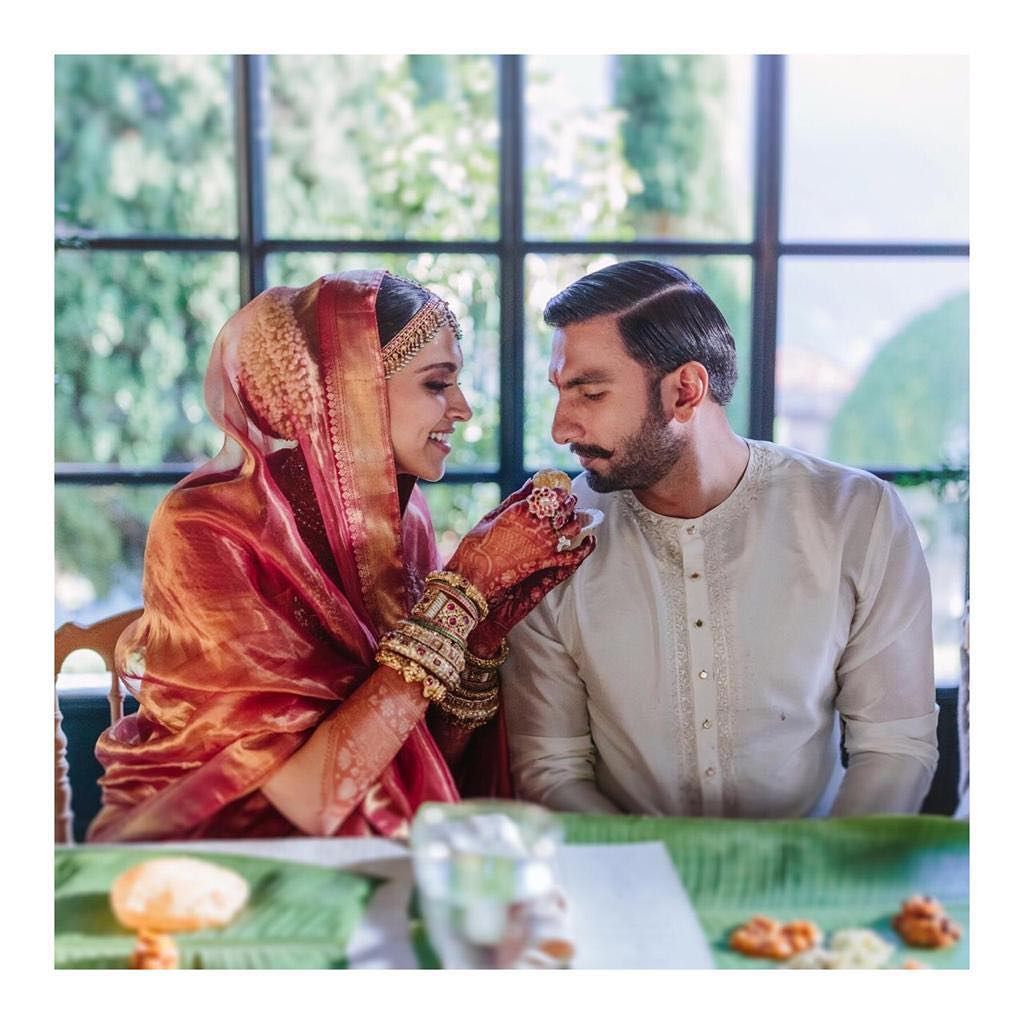
Image via Pinterest
In a traditional Konkani post-wedding meal, the bride and groom are treated to a sumptuous spread reflecting the culinary heritage of the region. Freshly caught fish curry, fragrant rice, and tangy solkadi, a refreshing and tangy drink made from coconut milk, kokum, and spices, are popular accompaniments in Konkani cuisine. They serve as palate cleansers and aid digestion, often taking center stage, accompanied by an array of vegetable curries and rice rotis. Assorted pickles and chutneys add zing to the meal, while traditional sweets like modak and kheer provide a sweet finale. Served on fresh banana leaves, this feast not only tantalizes the taste buds but also embodies the spirit of Konkani hospitality, celebrating the joyous union of the newlyweds symbolizing the couple's bond of love and sharing, with flavoursome delights steeped in tradition. "Ghar Borche" signifies the hosting of a lavish post-wedding feast by the couple's families, symbolizing the groom's family's warm welcome to the bride's new abode, often followed by a contemporary wedding reception to celebrate with extended family and friends.
In the coastal paradise of Konkani weddings, every 'I do' is a promise sealed with the sun, the sea, unique tradition, and a whole lot of love. Do you agree?
ALSO READ: Sweet Endings: Romantic and Authentic Dessert Ideas for South Indian Weddings


